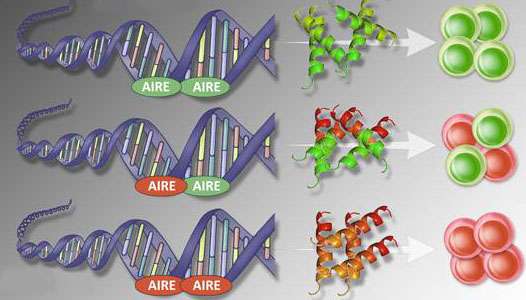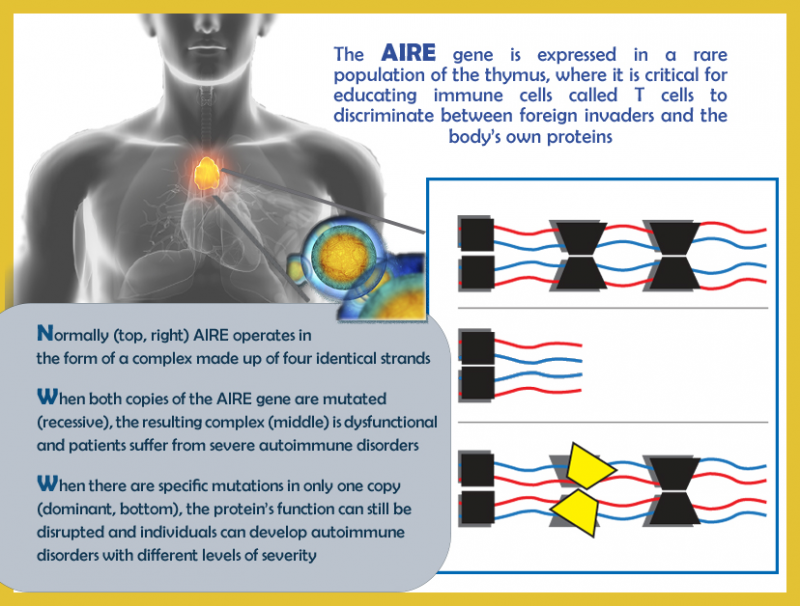Rare autoimmune disease may be more common than we thought

Mutations in a key autoimmunity-associated gene are surprisingly common and are responsible for a previously unknown form of a rare autoimmune disorder called APS-1, according to a study published on June 16 in the journal Immunity. Contrary to past findings, the study reveals that mutations in only one copy of the autoimmune regulator (AIRE) gene can produce symptoms of the disease.
Moreover, some patients have adult-onset symptoms that clinicians may be misattributing to more common autoimmune conditions. The findings could pave the way for more specific diagnostic and treatment strategies for patients with organ-specific autoimmune diseases whose cause was previously unknown.
"The study corrects a well-established belief that autoimmune disorders linked to mutations in the AIRE gene are recessive, rare, and produce symptoms in childhood," says senior study author Eystein Husebye of the University of Bergen in Norway. "We demonstrate that in addition to well-established recessive mutations, there are multiple mutations in the AIRE gene that operate in a dominant fashion and are quite frequent in the general population. The result of such mutations is a milder disease masquerading as more common organ-specific autoimmune diseases."
Mutations in AIRE cause autoimmune polyendocrine syndrome type 1 (APS-1), which causes fungal infection of the skin, mouth, and genital region, as well as parathyroid and adrenal gland malfunction, resulting in symptoms such as weakness, fatigue, and low blood pressure. The majority of patients develop at least two of these features, which typically appear in childhood (first symptoms typically appear around four years old). All except for one APS-1-causing mutation in the AIRE gene were assumed to be inherited in a recessive manner, meaning that mutations in both copies of the gene are required to cause the disease.
Husebye and his team began to question this dogma while puzzling over an unusual clinical case. One of their patients presented with adult-onset APS-1 manifestations, including fungal infections and adrenal gland malfunction, but only one copy of the AIRE gene was mutated. Moreover, many of the patient's children had the same single-copy AIRE mutation and various clinical features of APS-1, confirming that this disease comes in two forms: classical (recessive), as established by past studies, and non-classical (dominant)—a previously unknown form of the disease.
When the researchers studied a variety of disease-causing AIRE mutations in human immune cells, they found that recessive mutations clustered in one part of the gene, whereas dominant mutations clustered in a different part of the gene. To validate these findings, the researchers screened large cohorts of patients with autoimmune diseases. They found that dominant mutations were present in several individuals and families suffering from various forms of organ-specific autoimmunity, resulting in symptoms such as depigmented skin and low blood levels of vitamin B12. Although the severity of symptoms varied, they were generally milder and appeared at a later age compared with classical APS-1 symptoms. The authors found that while the patients had one fully functional AIRE gene, the protein product of the mutated AIRE gene was able to inhibit the function of the unaffected protein in a "dominant" manner.

Moreover, analysis of large datasets revealed that dominant AIRE mutations are more common than previously thought, occurring in at least one out of every 1,000 individuals. However, more studies are needed to confirm the prevalence in larger populations. Moving forward, the researchers would also like to analyze AIRE dominant mutations in various model systems and in additional patient cohorts with various organ-specific diseases.
In the meantime, Husebye has important advice based on the new findings. "Clinicians should be aware of and sometimes screen for AIRE mutations when they encounter patients with familial clustering of organ-specific diseases, especially when manifestations that are commonly seen in APS-1 are present," he says. "Personalized follow-up with a tailored screening program for mutation carriers may also be warranted, because it is reasonable to believe that individuals with dominant AIRE mutations have an increased risk for developing one or more organ-specific autoimmune diseases."
More information: Immunity, Oftedal et al.: "Dominant Mutations in the Autoimmune Regulator AIRE Are Associated with Common Organ-Specific Autoimmune Diseases" dx.doi.org/10.1016/j.immuni.2015.04.021


















